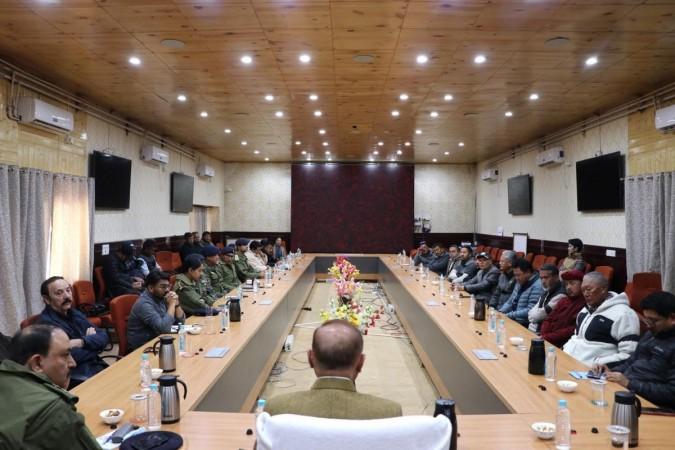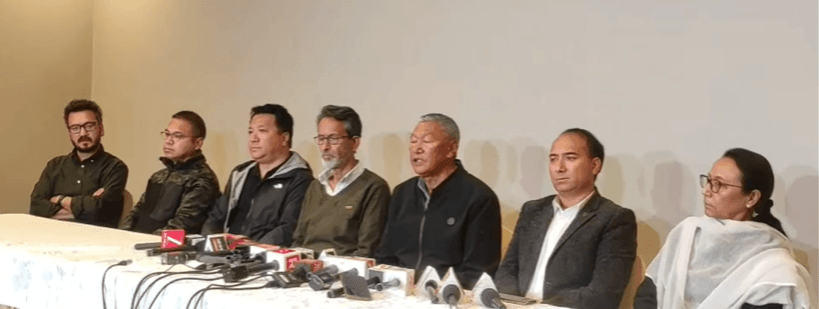
Amid prevailing tension in the cold desert, for the first time since the September 24 violence, a meeting between the civil society of Leh and the Ladakh administration was held to restore lasting peace in the region.
In a positive development signaling a thaw in the ongoing stalemate in Ladakh, the Union Territory administration and members of the civil society of Leh on Thursday held their first meaningful meeting since the September 24 violence, which claimed four civilian lives.
The meeting, held in a cordial and constructive atmosphere, marked the first direct engagement between the two sides after weeks of tension and deadlock following the unprecedented clashes in Leh. The dialogue, which lasted for nearly two hours, was attended by top religious figures, senior political leaders, and key members of the Leh Apex Body (LAB), who have been spearheading the region's agitation for constitutional safeguards and the restoration of democratic rights.
Although no formal announcement was made by either side after the meeting, members of the civil society described the interaction as "very positive and encouraging."
"For the first time, the Union Territory administration has responded positively to our key demands, including a judicial probe into the September 24 incident, lifting of the internet ban, and the release of all detained persons," said Chering Dorjey, President of the Ladakh Buddhist Association (LBA), while speaking to The International Business Times.

"Discussions were conducted in a spirit of reconciliation, with both sides expressing willingness to move forward through dialogue," he said, adding that the UT administration had assured the delegation that the concerns of the people would be addressed with sensitivity and seriousness.
"The administration has shown a positive approach this time. We raised all our major concerns, and the response has been constructive," Dorjey added. "We are hopeful that this dialogue will pave the way for the restoration of normalcy and mutual trust."
Chief Secretary of the Union Territory of Ladakh, Dr. Pawan Kotwal, chaired the meeting to deliberate on the recent unfortunate incident that occurred on September 24, 2025, and its aftermath.
Addressing the gathering, Dr. Kotwal emphasized that Ladakh has always been recognized for its peace, patriotism, harmony, unique culture, and hospitality — qualities that attract people from across the globe. He expressed deep sorrow over the tragic loss of four precious lives and assured that the UT administration stands firmly with the people of Ladakh in restoring normalcy at the earliest.
The Chief Secretary, along with all leaders present, observed a two-minute silence in memory of the deceased citizens.
Prominent religious and political leaders, including Leh Apex Body President Thupstan Chhewang, Tsering Dorjey Lakruk, Ashraf Ali Barcha, and Abdul Qayoom, expressed condolences to the bereaved families. They urged the administration to order a judicial inquiry into the September 24 incident and demanded the release of innocent youth in police custody. The leaders also emphasized the need for adequate financial compensation to the families of the victims, most of whom belong to middle-class backgrounds.
Ladakhi Leaders Condemn 'Anti-National' Label
The leaders jointly condemned certain sections of the mainstream media for portraying Ladakhis as "anti-national," highlighting the community's historic contributions to the nation, including over 600 gallantry awards earned by its citizens.
They reiterated their collective demand for Sixth Schedule safeguards, statehood for Ladakh, and the early resumption of talks with the Ministry of Home Affairs (MHA).
Speaking on the occasion, Chief Executive Councillor (CEC), LAHDC Leh, Tashi Gyalson, stated that while the tragic loss of lives cannot be reversed, dialogue with the Government of India must continue to bridge the existing trust deficit. He emphasized that the LAHDC Councils should play a constructive role as a bridge between the government and the public, ensuring transparency and sincerity in all discussions.
Those who attended the meeting included Thiksey Rinpoche, Drukpa Thuksey Rinpoche, Thupstan Chhewang (President, LAB), Tsering Dorje Lakrook (President, LBA Leh), Tashi Gyalson (CEC, LAHDC Leh), Dorjay Stanzin (President, Ladakh Gonpa Association), Abdul Qayum (President, Anjuman Moin-ul-Islam), Ashraf Ali Barcha (President, Anjuman Imamia), Sonam Parvez (President, Christian Association, Leh), Thinles Nurbu (Vice President, Youth Wing, LBA), Motup, Stanzin Onpo, Gelek, Tsering Namgyal (Councillor, Lower Leh, Leader of Opposition), Tashi Gyalson (President, BJP), Tsering Phuntsok (President, AAP), and P.T. Kunzang (BJP).
Background and Way Forward
The September 24 incident plunged Ladakh into turmoil, with violent clashes between protestors and security personnel leading to the death of four civilians and injuries to several others. The violence was followed by widespread anger, protests, and a near-complete breakdown in communication after authorities imposed restrictions and suspended internet services across the region.
Since then, both the Leh Apex Body (LAB) and the Kargil Democratic Alliance (KDA) had hardened their positions, refusing to engage in talks until their key conditions — including a judicial probe and release of detained activists — were met.
Thursday's meeting, therefore, marks a crucial step toward rebuilding trust and reopening channels of communication.
While the official outcome of the meeting has not yet been announced, both sides have agreed to maintain dialogue in the coming days. Civil society representatives expressed optimism that concrete steps would soon follow to address the grievances of the people and restore normalcy in the region.
"This meeting has broken the ice after weeks of tension," said another member of the Leh Apex Body. "We hope this spirit of dialogue continues and results in justice for the victims and peace for the people of Ladakh."
Officials from the UT administration remained tight-lipped about the deliberations but confirmed that "dialogue has begun on a positive note."
The development is being viewed as a hopeful sign amid the prolonged unrest in Ladakh, which has witnessed widespread discontent over governance issues, political representation, and the demand for constitutional safeguards under the Sixth Schedule of the Constitution.
Internet services restored, schools, colleges functioning smoothly
In a significant development reflecting the return of peace and stability, the Union Territory of Ladakh has witnessed the complete restoration of normalcy with uninterrupted internet services, smooth functioning of educational institutions, and resumption of public transport and other civic activities, as restrictions in Ladakh have been lifted in view of the people's cooperation and responsible behavior.

















